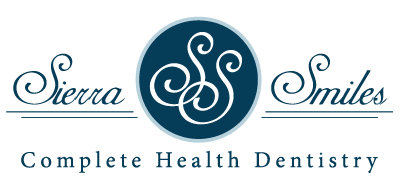Did you know that your dentist can be a key ally in the detection and treatment of health conditions that are not always related to your teeth? At Sierra Smiles, our emphasis on complete health includes supporting our patients with treatment that goes beyond the care of your teeth. Take a look at these three conditions your dentist can detect to help you live a healthier, happier life.
Dental Treatment for TMJ
Many patients in our practice receive dental treatment for TMJ. Because of that, and because November just so happens to be TMJ Awareness Month, we think it is important to share how your dentist can help you with this condition. TMJ occurs when the joint that allows your jaw to open and close and move in a sliding motion becomes damaged in some way. This can be due to genetics, injury, arthritis or overuse like persistent gum chewing or grinding of your teeth. The latter is fairly common amongst TMJ patients. The condition can be quite painful and cause the jaw to lock up or “click” while speaking or eating.
Treatment of TMJ can vary. Your dentist is usually a key line of defense in helping treat this condition. The first option(depending on the severity of the deterioration) is simply to assess your daily habits and determine if there is a changeable factor. Your dentist will ask if you chew gum for extended periods of time or have habits like chewing on small objects. These are habits that require behavioral changes to halt TMJ. If you cannot resolve the pain and deterioration of TMJ that way, your dentist can also offer you guards that prevent you from grinding your teeth while you sleep or wherever you do significant clenching of the jaw. Guards are custom fitted to ease discomfort while sleeping. Surgery for TMJ is not very common and typically considered a last resort for only the most severe cases.
Detect and Treat Sleep and Airway Issues
Sleep and airway issues are another surprising condition your dentist can possibly treat. Sleep apnea (obstructive sleep apnea) occurs in millions of adults and about 80% of those cases are undiagnosed. Sleep apnea is caused when the muscles of the throat relax during sleep, causing the patient to stop breathing for short periods of time. Sleep apnea can:
- Have a negative impact on mental health
- Increase risk of chronic disease
- Cause exhaustion
- Cause mood swings
- Affect work performance
- Affect relationships
If you have been feeling exhausted, shaky or confused during waking hours, your dentist might be able to help you get to the bottom of the problem. Your dentist can help determine if you have sleep apnea as well as if that apnea is potentially treatable with dental care. Your dentist may also be able to tell you if you need a more extensive sleep study from a somnologist. If diagnosed with treatable apnea, your dentist can provide you with a sleep apparatus to help keep the airway open while you sleep without the use of oxygen tubes or machinery. The device is fitted to your mouth to reduce discomfort and support the airway while sleeping.
Detect Mouth Cancer
Did you know that your dentist can help with detecting mouth cancer? November is also Mouth Cancer Awareness Month, driving increased understanding and proactive prevention through education. Your dentist is a leading force in the fight to prevent, detect and support treatment of oral cancer. Routine health physicals with your regular doctor don’t often include a careful examination of the mouth and gums. This leaves you in the dark about potential warning signs that you may have signs of mouth cancer.
That’s one of the reasons that we emphasize the importance of visiting the dentist regularly — once every six months, or as allowed by your insurance provider. Your dentist and dental technicians keep careful track of the condition of your mouth. They know about your daily habits that increase your risk factor such as smoking or using chewing tobacco. They monitor areas of concern and alert you to the potential issues. Your dentist can watch trouble spots, track changes to gum and mouth tissue and examine your throat for discoloration. Unless you see a specific non-dental oral specialist, your dentist and your dental technicians will spend the most time of any profession examining and tracking your oral health. Your dentist can take samples of trouble spots or make referrals for more aggressive intervention.
As you can see, your dentist is more than an expert on teeth! They are a valuable resource for supporting your complete health. Download our free ebook—10 Things Your Mouth Says About Your Health to find out how taking care of your mouth benefits your entire body or to learn more about our services give us a call today at one of our convenient locations. Zephyr Cove: 775-515-8930 Damonte Ranch: 775-443-4305 or Kietzke Lane: 775-786-1911.
